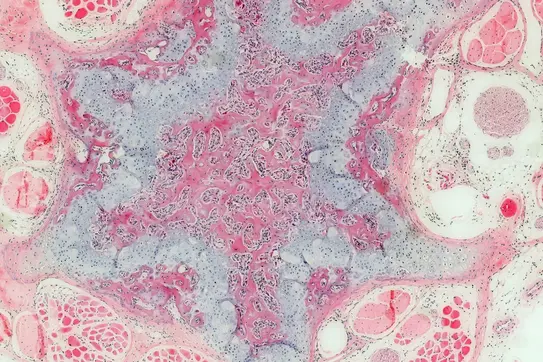Cell and Tumor Biology
The Research Topic Cell and Tumor Biology positions itself at the forefront of exploring fundamental processes that define life and drive cancer at the molecular, cellular and organismal level.

Cells, with their complex inner molecular and biochemical networks, are the fundamental building blocks of life, working in concert to create tissues and organs. Genetic alterations not only alter their internal homeostasis, but also affect cells’ interaction with their microenvironment. Progressive accumulation of genetic and non-genetic changes plays a prominent role in malignant transformation of cells, driving cancer initiation, progression, therapy resistance, and metastasis. The Research Topic Cell and Tumor Biology positions itself at the forefront of exploring fundamental processes that define life and drive cancer at the molecular, cellular and organismal level.
The common goal of the Topic scientists is to unravel the diverse mechanisms of cancer to provide a rational basis for novel diagnoses and transformative treatment strategies that are then evaluated in early clinical trials. Leveraging state-of-the-art technologies and pioneering approaches, we study complex cellular behaviors of normal and tumor cells across different scales. Researchers develop and apply single-cell multi-omics approaches, CRISPR screens and metabolic assays, and advanced imaging technologies. We systematically integrate this with bioinformatics and machine learning to generate data driven hypotheses. Our approaches incorporate data on genomic, epigenomic, and epitranscriptomic landscapes, interactions between components of signaling cascades, and metabolic networks as well as processes of cell-cell communication, which together shape the complex, dynamic ecosystems in both normal and cancerous tissues. These deep molecular insights are then mechanistically explored using a wide range of genetically manipulatable preclinical models including stem cell and tumor derived organoids and complex mouse models. Once the underlying biological principles and their regulation are revealed, the most promising concepts are further developed together with our clinical partners with the aim to establish early investigator-initiated trials (IITs) in patients focusing on novel strategies to target tumor progression, therapy resistance, relapse, and metastasis. This dynamic integration bridges the gap between laboratory breakthroughs and real-worldpatient care. Scientists of the Research Program are participating in four major research areas:
Stem Cell Research
Effective cancer therapies require elimination of cancer stem cells (CSCs), which drive tumor heterogeneity, therapy resistance and relapse through self-renewal and high differentiation plasticity. Research teams are exploring the mechanisms controlling stem-like properties by investigating normal stem cells in the context of healthy tissues, and malignant stem cells in primary tumors and metastases from different cancer entities, including leukemia, colon, breast, lung, skin and brain cancers. Understanding the underlying biology of stem cells and their role in therapy response and resistance, we are developing novel therapeutic approaches precisely targeting these highly aggressive tumor cells. (Contributing PIs: Essers, Frye, Jackstadt, Liu, Loges, Mall, Martin-Villalba, Milsom, Monyer, Niehrs, Trumpp, Utikal).
Tumor Specific Mechanisms and Metabolic Dysregulation in Cancer
Cancer cells exploit aberrant cellular pathways to survive and proliferate leading to tumor growth. Topic scientists uncover tumor specific mechanisms driving cancer progression. They investigate the function of novel regulators of signaling pathways and the role of RNA modifications in healthy and tumor cells. Deregulated metabolism is a hallmark of cancer and another key focus of this program. We investigate metabolic dysregulation across different tumor entities and explore mechanisms controlling ferroptosis, a specific cell death pathway linked to oxidative stress. Identified vulnerabilities of cancer cells are used to develop effective therapeutic strategies. (Contributing PIs: Augustin, Dick, Frye, Gunkel/Miller, Milsom, Jackstadt, Liu, Loges, Lyko, Monyer, Niehrs, Palm, Patrizi, Schulze, Trumpp).
Tumor Microenvironment and Metastasis
During tumor growth, cancer cells interact with complex and dynamic tumor microenvironments (TME) that promote their survival and dissemination. Scientists in the program study inflammation, cellular components, and soluble factors within the tumor microenvironment (TME) that create a tumor-supportive niche and promote immune evasion and suppression. As the majority of cancer deaths occur due to metastasis, Topic researchers intensively study the mechanisms that drive tumor progression and the dedicated steps that lead to metastasis formation, such as circulating tumor cells, with the goal of identifying and validating novel therapeutic vulnerabilities to reduce cancer mortality and overcome therapy resistance. (Contributing PIs: Augustin, Frye, Jackstadt, Krämer, Liu, Loges, Patrizi, Schölch, Schulze, Trumpp).
Translational activities
Our researchers actively translate their findings from bench to bedside and back by forward - and reverse translation. This includes investigator-initiated early clinical trials (IITs) and industry-sponsored later phase trials targeting AML, lung, colon and pancreatic cancer as well as cancers of unknown primary (CUP). The dedicated goal is to translate laboratory insights into actionable therapies, aspiring to make a lasting clinical impact (Contributing PIs: Jackstadt, Krämer, Kulozik, Liu, Loges, Schölch, Trumpp, Utikal).
The Research Topic Cell and Tumor Biology is associated with the Heidelberg Institute for Stem Cell Technology and Experimental Medicine (HI-STEM gGmbH) and the DKFZ Hector Cancer Institute at University Medicine Mannheim and is part of the DKFZ-ZMBH Alliance, a strategic partnership between the Research Topic and the Center for Molecular Biology of Heidelberg University (ZMBH).